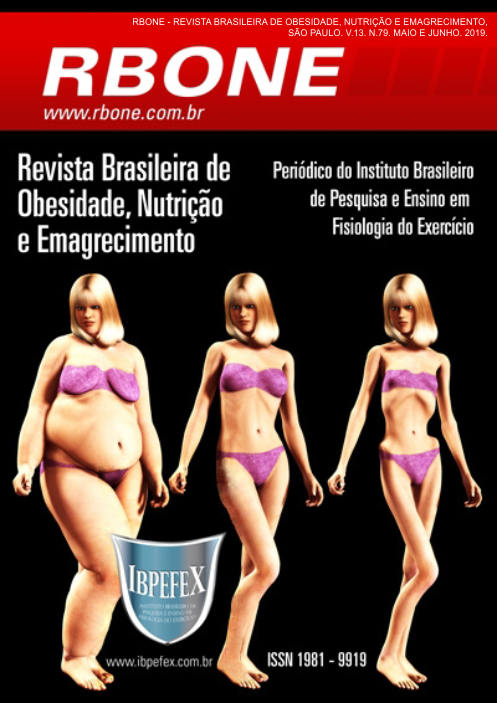Evolution of the diet in the pos-operatory of bariatric surgeries: integrating review of the literature
Abstract
More and more people are using bariatric surgery for weight loss and improvement of comorbidities associated with overweight, the most common Roux-en-Y gastric bypass technique (Fobi-Capella), this surgical technique is currently considered standard gold. The weight loss of these patients is guaranteed by low food intake due to decreased gastric capacity and also by malabsorption of nutrients. Objective: This study aims to verify the different types of dietary conducts in the OP applied in different places and their aspects more relevant to the behavior of the nutritionist. Methods: Survey of literary articles, search in the Latin American and Caribbean databases on Health Sciences (LILACS), Medline, Ibecs, Sec. Est. Saúde P, Scielo and Google Scholar. Being used for the search of the articles the descriptors bariatric surgery and postoperative diet and their combinations in the Portuguese and English languages. Results: The authors emphasize the need to start the postoperative diet through the liquid diet, in small amounts and progress until reaching the general diet, however, they differ as to the time in days for the evolution of the consistency of the diets. Conclusion: Despite the similarity of the conduct, further studies are needed to establish a standardized protocol on diet after bariatric surgery in order to guide health professionals and to avoid that nutrient and micronutrient deficits continue to occur in these patients.
References
-Burgos. M.G.P.A. Abordagem Dietoterápica nos Diferentes Procedimentos Cirurgicos. In: Burgos. M.G.P.A. (Org). Nutrição em Cirurgia Bariátrica. Rio de Janeiro. Rubio. 2011. p. 109-129.
-Gomes, S.G.; Rosa, M.A.; Faria, H.R.M. Perfil nutricional dos pacientes de pós-operatório de cirurgia bariátrica. Nutrir Gerais. Revista Digital de Nutrição. Vol. 3. p. 462-476. 2009.
-Hernández, M.A.R.; Sancho, E.M.; Fuster, M.A.; e colaboradores. Comparación a 5 años de dos técnicosde cirugía bariátrica en pacientes con obesidad mórbida seguidos em consulta enfermera. Nutr Hosp. Vol. 24. p. 667-675. 2009.
-Kulick, D.; Hark, L.; Deen, D. The bariatric surgery patient: A growing role for registered dietitians. Journal of the American Dietetic Association. Vol. 110. p. 593-599. 2010.
-Protocolo de funcionamento do centro de cirurgia bariátrica do hospital das clínicas da faculdade de medicina de Ribeirão Preto-USP (CCB do HCFMRP-USP).2009.Ribeirão Preto. Disponível em: . Acesso em 04/06/2016.
-Rubio, M.A.; Moreno, C. Implicaciones nutricionales de la cirugía bariátrica sobre El tracto gastrointestinal. Nutr Hosp. Vol. 22. p. 124-134. 2007.
-Sanches, G.D.; Gazoni, F.M.; Konishi, R.K.; e colaboradores. Cuidados intensivos para pacientes em pós-operatório de cirurgia bariátrica. Revista Brasileira de Terapia Intensiva. Vol. 19. p. 205-209. 2007.
-Soares, F.L.; Sousa, L.B.; Corradini-Perini, C.; e colaboradores. Food Quality in the late postoperative Period of bariatric surgery: An evolution using the bariatric food Pyramid. Obes Surg. Vol. 24. p. 1481-1486. 2014.
Authors who publish in this journal agree to the following terms:
- Authors retain the copyright and grant the journal the right of first publication, with work simultaneously licensed under the Creative Commons Attribution License BY-NC which allows the sharing of the work with acknowledgment of the authorship of the work and initial publication in this journal.
- Authors are authorized to enter into additional contracts separately for non-exclusive distribution of the version of the work published in this journal (eg, publishing in institutional repository or book chapter), with acknowledgment of authorship and initial publication in this journal.
- Authors are allowed and encouraged to post and distribute their work online (eg, in institutional repositories or on their personal page) at any point before or during the editorial process, as this can bring about productive change as well as increase impact and impact. citation of published work (See The Effect of Free Access).






